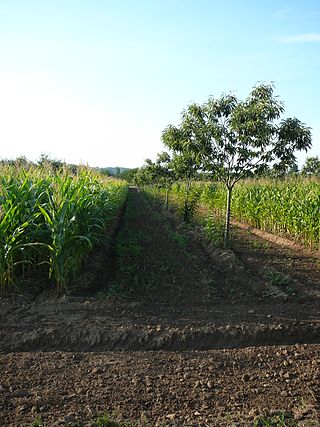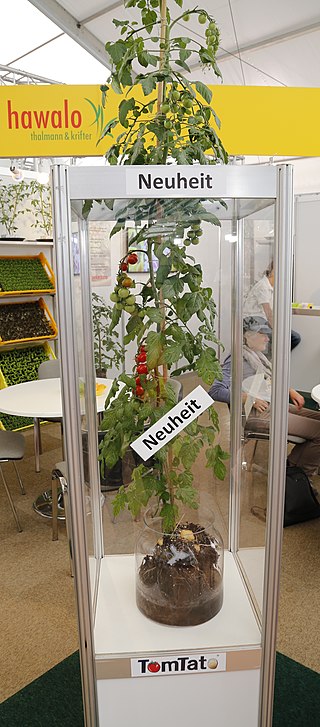Related Research Articles

A garden is a planned space, usually outdoors, set aside for the cultivation, display, and enjoyment of plants and other forms of nature. The single feature identifying even the wildest wild garden is control. The garden can incorporate both natural and artificial materials.

Prairies are ecosystems considered part of the temperate grasslands, savannas, and shrublands biome by ecologists, based on similar temperate climates, moderate rainfall, and a composition of grasses, herbs, and shrubs, rather than trees, as the dominant vegetation type. Temperate grassland regions include the Pampas of Argentina, Brazil and Uruguay, and the steppe of Ukraine, Russia, and Kazakhstan. Lands typically referred to as "prairie" tend to be in North America. The term encompasses the area referred to as the Interior Lowlands of Canada, the United States, and Mexico, which includes all of the Great Plains as well as the wetter, hillier land to the east.

Urban agriculture refers to various practices of cultivating, processing, and distributing food in urban areas. The term also applies to the area activities of animal husbandry, aquaculture, beekeeping, and horticulture in an urban context. Urban agriculture is distinguished from peri-urban agriculture, which takes place in rural areas at the edge of suburbs.

The Kentucky coffee tree, also known as American coffee berry, Kentucky mahogany, nicker tree, and stump tree, is a tree in the subfamily Caesalpinioideae of the legume family Fabaceae, native to the Midwest, Upper South, Appalachia, and small pockets of New York in the United States and Ontario in Canada. The seed may be roasted and used as a substitute for coffee beans; however, unroasted pods and seeds are toxic. The wood from the tree is used by cabinetmakers and carpenters. It is also planted as a street tree.

Agroforestry is a land use management system that integrates trees with crops or pasture. It combines agricultural and forestry technologies. As a polyculture system, an agroforestry system can produce timber and wood products, fruits, nuts, other edible plant products, edible mushrooms, medicinal plants, ornamental plants, animals and animal products, and other products from both domesticated and wild species.

A community garden is a piece of land gardened or cultivated by a group of people individually or collectively. Normally in community gardens, the land is divided into individual plots. Each individual gardener is responsible for their own plot and the yielding or the production of which belongs to the individual. In collective gardens the piece of land is not divided. A group of people cultivate it together and the harvest belongs to all participants. Around the world, community gardens exist in various forms, it can be located in the proximity of neighborhoods or on balconies and rooftops. Its size can vary greatly from one to another.
Uran gardening is the practice of growing vegetables, fruit and plants in urban areas, such as schools, backyards or apartment balconies.

Soil biology is the study of microbial and faunal activity and ecology in soil. Soil life, soil biota, soil fauna, or edaphon is a collective term that encompasses all organisms that spend a significant portion of their life cycle within a soil profile, or at the soil-litter interface. These organisms include earthworms, nematodes, protozoa, fungi, bacteria, different arthropods, as well as some reptiles, and species of burrowing mammals like gophers, moles and prairie dogs. Soil biology plays a vital role in determining many soil characteristics. The decomposition of organic matter by soil organisms has an immense influence on soil fertility, plant growth, soil structure, and carbon storage. As a relatively new science, much remains unknown about soil biology and its effect on soil ecosystems.

Prunus americana, commonly called the American plum, wild plum, or Marshall's large yellow sweet plum, is a species of Prunus native to North America from Saskatchewan and Idaho south to New Mexico and east to Québec, Maine and Florida.

Emma Prusch Farm Park is a 43.5 acre park in East San Jose, California. Donated by Emma Prusch to the City of San Jose in 1962 to use to demonstrate the valley's agricultural past, it includes a 4-H barn, community gardens, a rare-fruit orchard, demonstration gardens, picnic areas, and expanses of lawn. The park is host to an annual Harvest Festival and is operated cooperatively by the San Jose Parks and Recreation Department and the non-profit Emma Prusch Farm Park Foundation.

The West Side Community Garden is a privately owned 501(c)(3) garden in Manhattan, New York City, United States. It is located between West 89th Street and West 90th Street in the middle of the block between Amsterdam Avenue and Columbus Avenue.

The Auburn Botanic Gardens are a botanical garden located in Auburn, New South Wales, Australia. It was established in 1977 and covers an area of 9.7 hectares. There are two lakes, a waterfall and bridges. Duck River winds through the garden. The garden is maintained by Cumberland Council. It is open daily, and there is a small entry fee on weekends. The Japanese gardens, which have hosted couples from overseas, are one of the main attractions.
Hattie Larlham is an American nonprofit organization that creates opportunities for more than 1,600 children and adults with intellectual and developmental disabilities in the state of Ohio. Services provided encompass medical, work training and employment, recreational, educational, and residential, catering to both children and adults.

The fig is the edible fruit of Ficus carica, a species of small tree in the flowering plant family Moraceae, native to the Mediterranean region, together with western and southern Asia. It has been cultivated since ancient times and is now widely grown throughout the world. Ficus carica is the type species of the genus Ficus, containing over 800 tropical and subtropical plant species.

Vaccinium pallidum is a species of flowering plant in the heath family known by the common names hillside blueberry, Blue Ridge blueberry, late lowbush blueberry, and early lowbush blueberry. It is native to central Canada (Ontario) and the central and eastern United States plus the Ozarks of Missouri, Arkansas, southeastern Kansas and eastern Oklahoma.

Western Sydney Regional Park is a large urban park and a nature reserve situated in Western Sydney, Australia within the suburbs of Horsley Park and Abbotsbury. A precinct of Western Sydney Parklands, a park system, and situated within the heart of the Cumberland Plain Woodland, the regional park features several picnic areas, recreational facilities, equestrian trails, and walking paths within the Australian bush.

The pomato is a grafted plant that is produced by grafting together a tomato plant and a potato plant, both of which are members of the Solanum genus in the Solanaceae (nightshade) family. Cherry tomatoes grow on the vine, while white potatoes grow in the soil from the same plant.

A community orchard is a collection of fruit trees shared by communities and growing in publicly accessible areas such as public greenspaces, parks, schools, churchyards, allotments or, in the US, abandoned lots. Such orchards are a shared resource and not managed for personal or business profit. Income may be generated to sustain the orchard as a charity, community interest company, or other non-profit structure. What they have in common is that they are cared for by a community of people.

David "Avocado" Wolfe is an American author and conspiracy theorist. He promotes a variety of pseudoscientific ideas such as raw foodism, alternative medicine, and anti-vaccine sentiment. He has been described as "[o]ne of Facebook's most ubiquitous public figures" as well as an "internationally renowned conspiracy theorist" and a "huckster".

A school garden is an area designated for students to learn how to cultivate flowers and vegetable gardens in their school. They are commonly established to improve students' health, social development, and academic achievement.
References
- ↑ Jones, Ben (March 8, 2010). "More urbanites have their pick of fresh fruit". USA Today.
- ↑ Gordon, Rachel (May 1, 2010). "S.F. garden to help feed the homeless". San Francisco Chronicle.
- ↑ Plain Dealer Editorial Board (September 2, 2011). "Cudell's fruited plain is a tasteful departure from the ordinary: editorial". Cleveland Plain Dealer. Archived from the original on May 2, 2015. Retrieved December 22, 2019.
- ↑ Gee, Pat (April 22, 2008). "Grants bring fruit trees to two Oahu schools". Honolulu Star-Bulletin.
- ↑ Schneider, Pat (February 8, 2010). "Advocates envision free fruit and nuts for Madison parks". The Capital Times (Madison WI).